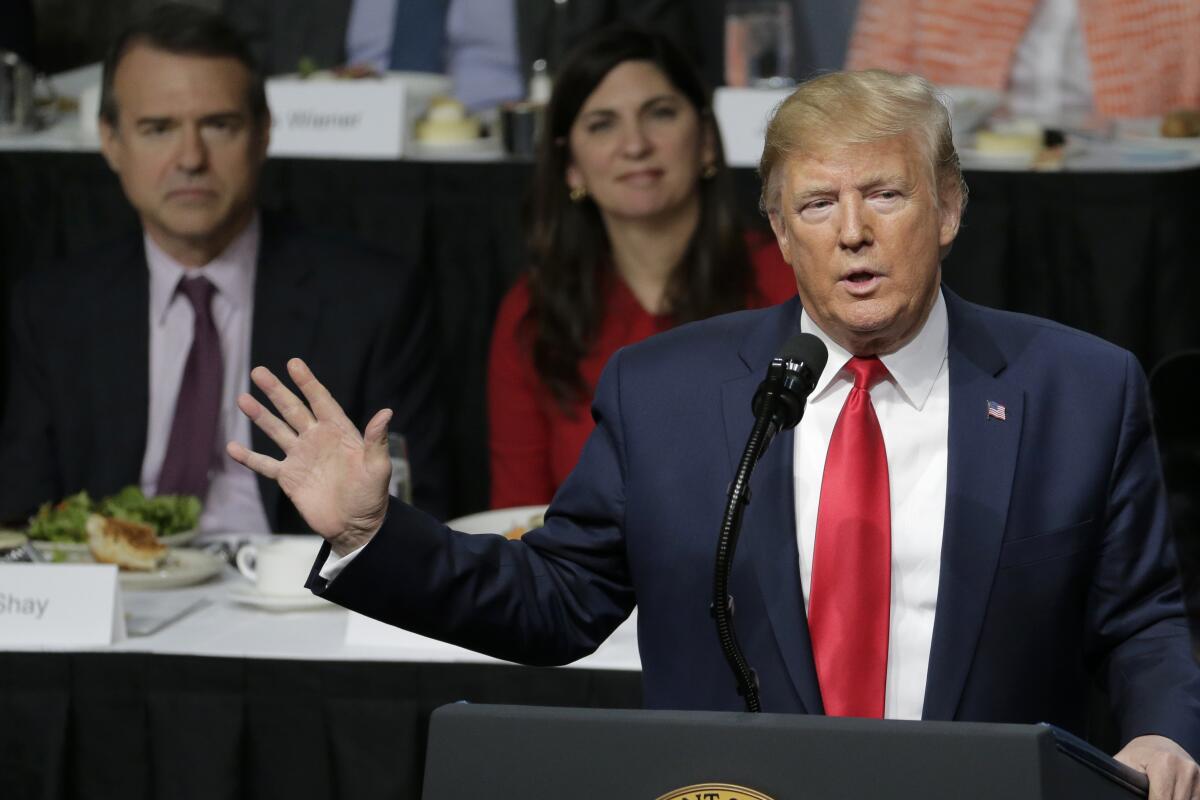Trump threatens to escalate the U.S.-China trade war if there’s no deal

President Trump said the United States will increase tariffs on Chinese goods if the first step of a broader trade agreement isn’t reached.
“If we don’t make a deal, we’re going to substantially raise those tariffs,” he said Tuesday in a speech to the Economic Club of New York. “They’re going to be raised very substantially. And that’s going to be true for other countries that mistreat us too.”
China is “dying” to make a trade deal with the U.S., Trump said, adding that he’d sign it only if it’s good for American companies and workers. Still, he said, “we’re close — a significant Phase 1 deal could happen, could happen soon.”
Trump also spent a good deal of his speech praising the overall gains that the U.S. economy has posted on his watch. Speaking to the audience of executives and economists, he criticized the Federal Reserve for not slashing interest rates to below zero and said that a Democratic victory in 2020 would endanger stock market gains.
Trump and Chinese President Xi Jinping had planned to sign the first phase of a U.S.-China trade deal at an international conference this month in Chile. That conference, though, was canceled because of social unrest in that country.
A new site for the signing hasn’t been announced. U.S. locations proposed by the White House have been ruled out, according to a person familiar with the matter. Locations in Asia and Europe are now being considered instead, the person said, asking not to be identified because the discussions weren’t public.
Trump reiterated complaints about China’s ascendance in the global economy. “Nobody’s cheated better than China,” he said. “The theft of American jobs and American wealth is over.”
U.S. stocks have rallied to record highs in recent days partly on optimism that tensions are cooling in an 18-month dispute between the world’s two largest economies involving tariffs on some $500 billion worth of goods.
The economic stakes of a prolonged trade war are rising for both countries.
China’s exports and imports continued to shrink in October, though slightly less than economists had forecast. The nation’s trade surplus with the United States widened over the month to $26.4 billion — heading in the opposite direction from the narrowing that Trump has called for to balance the countries’ trading relationship.
In his speech Tuesday, Trump renewed his assault against the Federal Reserve, saying it was hurting the United States by not copying other central banks in deploying negative interest rates.
“We are actively competing with nations who openly cut interest rates, so now many are actually getting paid when they pay off their loan, known as negative interest,” Trump said.
“Give me some of that money. I want some of that money. Our Federal Reserve doesn’t let us do it,” Trump said, drawing a laugh from the audience. “It puts us at a competitive disadvantage to other countries.”
The Fed cut interest rates last month for the third time this year to shield the economy from uncertainty over trade and weaker global growth, while signaling that it won’t cut further unless the outlook worsens. The Fed’s benchmark rate now lies in a target range of 1.5% to 1.75%, which is low by historic standards but higher than Japan and the euro zone, which have shifted to negative rates in an effort to lift moribund economies.
“We’re paying actually high interest. We should be paying by far the lowest interest,” Trump said. After noting the gains U.S. stock markets have notched during his presidency, he said they could have risen a further 25% “if we had a Fed that worked with us.”
Trump economic advisor Larry Kudlow subsequently told CNBC that he didn’t know whether Trump actually wants negative interest rates in the United States.
“I don’t think the U.S. needs negative rates,” said Kudlow, who is director of the White House’s National Economic Council. “Our economy is in very good shape.”
The president has persistently sought to shift blame for slowing U.S. economic growth onto the Fed and away from his trade war with China, which some businesses say has prompted them to delay investment decisions. U.S. manufacturing has slumped, but consumers remain resilient, and employers continue to hire new workers at a solid pace.
Fed Chairman Jerome Powell is scheduled to testify before Congress on Wednesday and Thursday.
Murray and Miller write for Bloomberg.
More to Read
Inside the business of entertainment
The Wide Shot brings you news, analysis and insights on everything from streaming wars to production — and what it all means for the future.
You may occasionally receive promotional content from the Los Angeles Times.










